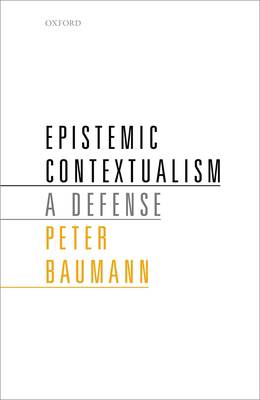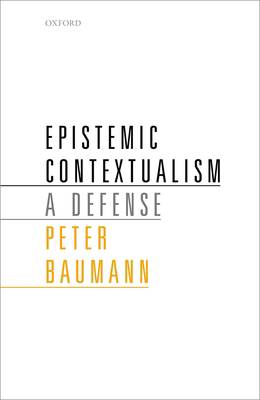
Bedankt voor het vertrouwen het afgelopen jaar! Om jou te bedanken bieden we GRATIS verzending (in België) aan op alles gedurende de hele maand januari.
- Afhalen na 1 uur in een winkel met voorraad
- In januari gratis thuislevering in België
- Ruim aanbod met 7 miljoen producten
Bedankt voor het vertrouwen het afgelopen jaar! Om jou te bedanken bieden we GRATIS verzending (in België) aan op alles gedurende de hele maand januari.
- Afhalen na 1 uur in een winkel met voorraad
- In januari gratis thuislevering in België
- Ruim aanbod met 7 miljoen producten
Zoeken
Omschrijving
Peter Baumann develops and defends a distinctive version of epistemic contextualism, the view that the truth conditions or the meaning of knowledge attributions of the form "S knows that p" can vary with the context of the attributor. The first part of the book examines arguments for contextualism and develops Baumann's version. The first chapter deals with the argument from cases and ordinary usage; the following two chapters address "theoretical" arguments, from reliability and from luck. The second part of the book discusses the problems contextualism faces, to which it must respond, and provides an extension of contextualism beyond epistemology. Chapter 4 discusses "lottery-scepticism" and argues for a contextualist response. Chapter 5 is dedicated to a homemade problem for contextualism: a threat of inconsistency. Baumann argues for a way out and for a version of contextualism that can underwrite this solution. Chapter 6 proposes a contextualist account of responsibility:
The concept of knowledge is not the only one which allows for a contextualist analysis and it is important to explore structural analogies in other areas of philosophy. The third part of the book is focused on some major objections to contextualism and alternative views, namely subject-sensitive invariantism, contrastivism and relativism.
The concept of knowledge is not the only one which allows for a contextualist analysis and it is important to explore structural analogies in other areas of philosophy. The third part of the book is focused on some major objections to contextualism and alternative views, namely subject-sensitive invariantism, contrastivism and relativism.
Specificaties
Betrokkenen
- Auteur(s):
- Uitgeverij:
Inhoud
- Aantal bladzijden:
- 276
- Taal:
- Engels
Eigenschappen
- Productcode (EAN):
- 9780198754312
- Verschijningsdatum:
- 20/12/2016
- Uitvoering:
- Hardcover
- Formaat:
- Genaaid
- Afmetingen:
- 152 mm x 236 mm
- Gewicht:
- 566 g

Alleen bij Standaard Boekhandel
+ 338 punten op je klantenkaart van Standaard Boekhandel
Beoordelingen
We publiceren alleen reviews die voldoen aan de voorwaarden voor reviews. Bekijk onze voorwaarden voor reviews.









